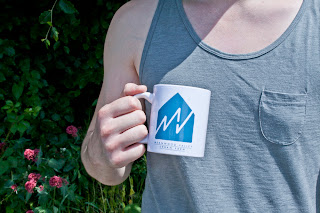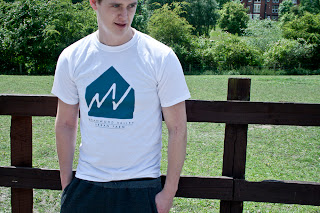At the end of the very last module of the course I think i can look back over this year as a while and I can definately say I have improved a great deal, from the standard of my work to the less design-y things like blogging and time management. This past module especially has afforded me a number of opportunities for growth, pushing me out of my comfort zone and forcing me to stretch and learn new ways of working and experience more aspects of a professional design practice.
Looking back especially I'm surprised I ever achieved the marks I did in first and second year as my work was terrible. Absolutely terrible. I don't think design is something that comes naturally to me, especially finishing work to a professional standard, and over the past 3 years I have learned through practice and through research a multitude of design strategies and solutions, and how to design effectively. Because of this, this past 3rd year I feel proud of the majority of my work rather than disdainful which is an achievement to me. I have learned how to be a designer and produce appropriate, high standard products.
Similarly I have learned a number of other major things within this module, such as working in a collaborative practice, how to work effectively with clients, how to make strong design decisions, how to add range and depth to my briefs, and how to manage my time more efficiently.
I think I can safely say that the management of my time has always been an issue. I don't like working within massively long deadlines and just having 'stuff' to do, and I'm always always unproductive for the first period of time for any module. This has not changed, but (and the 'but' is important) I have through this module learned to set myself deadlines, to constantly evaluate my progress and use action plans to push my work forward, making full day-to-day weekly plans in order to keep my own mind in line with the work I have to do. And while, when making these, I've not always stuck to my plans, the process alone has kept me focussed on what needs to be done so that come crunch time I'm neither forcing the issue or flapping for answers.
I specifically designed and planned my briefs for this module to allow me to work with clients and find a more real-world base for my work rather than a lot of self initiated stuff. I wanted that task of back and forth conversation, of tailoring my designs to the specific needs of a client who has a distinct knowledge of their audience, to working with an outside influence to help frame my work within real world environments and scenarios. While a number of my live briefs became 'dead' (they still existed but were no longer dictated as much by the client) the principle was still in play and I was able to focus my work in order for it to be more applicable and appropriate. A massive lesson in live briefs was the year book, which was, for me, a massive success - I'm still a little baffled that I had a hand in designing and producing a 60 page year book on a run of 400 copies - though it taught me alot about the whims and whimsy of clients. We had a number of situations involving extra members of the course who decided to show up to one or two meetings with radical changes and it became quite a political exercise in trying to diplomatically tell these people they were wrong, I mean work with them to come to a compromise. It was a big learning curve and we had to be tough and bold in knowing what our vision had been for the entire process and what the clients vision had been and to stop them making rash decisions for the sake of it and view the entire picture.
Speaking of the yearbook, the collaborative process was one I also really enjoyed, getting to work closely with a team and get to know them more, both as designers and people. We had, in my opinion anyway, a really smooth group dynamic and pretty much everything, bar a few niggles, went to plan and we got on well. Thats not to say we didn't disagree on things - we did - but the process was one of compromise and dedication to the overarching aim of the brief - to produce a high quality year book with a strong design direction - rather than to personal opinions or diva moments. It helped me to see how a design direction can be influenced for the better by the coming together of a few creative minds, how the end result can be far more considered and appropriate than could be achieved by one person. It is something I can take into my personal practice that although there may only be one of me, peer input and a more objective view on my work can influence it for the better.
A big part of my briefs this module was turning them into "substantial" briefs, adding a range of deliverables to up the quantity of work for each brief. I feel like more than ever I have learned how to not just think about range, but to find an appropriate number of design solutions and products that can sit along side the original design or product, and how the fit contextually within their environment. I think a bit part of this has been down to my action plans in which I regularly detailed not just the main focus of the brief but the possible extra deliverables I could investigate.
In this regard I'm going to take the whole weekly action plan thing into my professional working life as it seems to be a massive positive step in helping me manage my time and work more effectively but also to focus and explore the possibilities within the brief to greater extent.
I think it would be fitting to finish on what is one of my biggest weaknesses and one my largest challenges to overcome that I have learned to deal with this module, and that is The Fear. Generally I'm not a confident person especially within an environment of professionals and experts where I have always felt inadequate and unconfident about my own work. This I call The Fear. And The Fear is not my friend. This module especially I have tried more and more to put myself out there, to be open to constructive criticism of my work, to discuss my work with professional practitioners and to approach and make contact with those I usually would not. I've said it before and I'll say it again, The Fear can be overcome by Bringing It. The toughest part of any new meeting, venture or practice is the beginning, that first contact, and I have attempted to, and need to continue to, Bring It, and not allow any personal doubt or fear to stand in the way of the progression of my practice and consequentially my career, because the only way to get anywhere is To Do, and that is predicated on trying. To try, is To Do.
Because if we don't try, we don't do. And if we don't do, then why are we here?
6.03.2011
Final Boards
Open publication - Free publishing
Open publication - Free publishing
Open publication - Free publishing
Open publication - Free publishing
Open publication - Free publishing
6.02.2011
6.01.2011
Subscribe to:
Comments (Atom)
























































